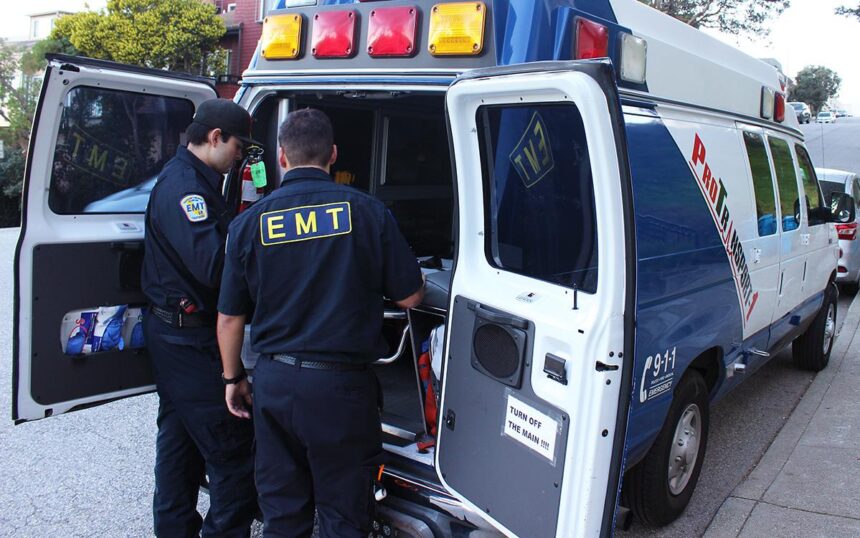In the bustling heart of San Francisco, where the echoes of city life intertwine with the urgent calls for help, Emergency Medical Technician (EMT) joanna Sokol has become a steadfast figure on the front lines. As part of the dynamic team responding to emergencies throughout the city’s diverse neighborhoods, Sokol brings a wealth of experience and insight to a profession that is both demanding and rewarding. In this exclusive Q&A, she shares her unique perspectives on the challenges faced by emts in an urban surroundings, the emotional toll of the job, and the often-unseen heroics that define their daily duties. Join us as we delve into the realities of emergency medical response through the eyes of someone who has truly seen it all.
Insights on Crisis Response from a Seasoned EMT in San Francisco
In the bustling streets of San Francisco, where every corner can become a crisis zone, Joanna Sokol, a seasoned EMT, has gathered invaluable insights from her years of experience. During our recent interview, she shared key strategies that can make all the difference in emergency situations. Effective communication, both with patients and fellow responders, emerges as an essential skill.Joanna emphasized that understanding the urgency of the situation and bestowing reassurance can often stabilize a patient’s mental state, facilitating a smoother operation.
When discussing the complexities of crisis management, Joanna highlighted multiple areas where preparedness is vital. She noted the importance of community training programs to ensure that civilians are equipped to handle basic emergencies,which can alleviate pressure on emergency services. Here are a few strategies she encourages:
- Stay Calm: your reaction influences the situation and those around you.
- Assess the Scene: Ensure your safety before engaging.
- Empathy is key: Listening to patients can provide crucial information.
- Teamwork: Effective collaboration can minimize chaos and expedite care.
Navigating the Challenges of Emergency Medical Services in Urban Environments
In urban settings like San Francisco, where population density and geographic obstacles converge, emergency medical services (EMS) face unique challenges. Joanna Sokol, an EMT with over a decade of experience, notes that navigating steep streets and high traffic volumes can be just as critical as the medical emergencies they encounter. The city’s varied landscape can delay response times, an aspect of urban EMS that requires constant adaptation and innovative logistical planning. As Sokol explains, the integration of technology has been a boon, providing real-time data that helps EMS units plan their routes more effectively and reduce friction associated with rush hour congestion. Additionally, collaborative practices with local hospitals and fire departments facilitate a more streamlined approach to patient care, ensuring that emergency resources are well-coordinated and efficiently utilized.
Moreover, the emotional toll of working in such a high-stakes environment cannot be understated. Sokol emphasizes the importance of mental health support for EMS teams, who frequently enough encounter traumatic situations and high-pressure scenarios. Regular debriefings and peer support systems are critical in providing a way for frist responders to process their experiences. A comparative analysis highlights how the well-being of EMS providers correlates with overall service effectiveness. In San Francisco, initiatives aimed at enhancing mental resilience, such as specialized training programs and wellness resources, have yielded positive outcomes not just for the EMTs but also for the communities they serve.
Essential Lessons Learned from the Streets: Recommendations for Aspiring EMTs
Joanna Sokol’s extensive experience on the streets of San Francisco has equipped her with invaluable wisdom for budding emergency medical technicians. First and foremost, she emphasizes the importance of effective communication.Establishing rapport with patients can significantly ease anxiety during high-stress situations. Sokol advises aspiring EMTs to develop strong verbal and non-verbal communication skills, ensuring they can extract vital information quickly while also providing reassurance. Additionally,ongoing education is crucial; keeping up-to-date with the latest protocols and certifications will not only enhance their skills but also boost confidence on the job.
Another critical lesson from Sokol is the need for adaptability in unpredictable environments. A typical shift may throw various challenges that require quick thinking and resourcefulness. She highlights the value of practicing situational awareness, which involves assessing the scene for potential hazards and understanding the dynamics between individuals involved in emergencies. Furthermore, maintaining a support system is essential. Whether it’s connecting with fellow EMTs or reaching out to mentors, the emotional toll of this career can be significant, and having a network can definitely help in navigating these challenges effectively.
Closing Remarks
Joanna Sokol’s experiences as an EMT in San Francisco provide a candid glimpse into the complexities and challenges of emergency medical services. Her insights not only highlight the resilience required in such a demanding field but also shed light on the vital role that first responders play in our communities. As Sokol continues her work on the front lines,her stories serve as a powerful reminder of the dedication and compassion that underpin the mission of emergency medical professionals. For those looking to gain a deeper understanding of the realities faced by EMTs, Sokol’s perspective offers invaluable lessons in service, empathy, and the human spirit in the face of adversity. As urban challenges evolve, so too does the need for awareness and support for our emergency responders, whose efforts are crucial to the well-being of our city.









